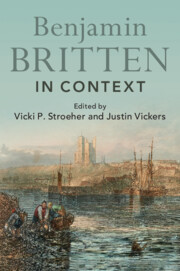Book contents
- Benjamin Britten in Context
- Composers in Context
- Benjamin Britten in Context
- Copyright page
- Dedication
- Contents
- Figures
- Tables
- Notes on Contributors
- Acknowledgements
- Bibliographic and In-Text Abbreviations
- Prologue
- Part I The Britten Circle(s)
- Part II British Musical Life
- Part III Britten and Other Composers
- Part IV Wordsmiths, Designers, and Performers
- Part V British Sociocultural, Religious, and Political Life
- Chapter 34 English and British National Identity in the Arts
- Chapter 35 The Place Within
- Chapter 36 Monarchy, Royalty, and Arts Patronage
- Chapter 37 Literary Leanings
- Chapter 38 Faith, Spirituality, and the Church
- Chapter 39 The Politics of the Closet
- Chapter 40 Communism, Socialism, and Pacifism in British Politics
- Epilogue Britten’s Legacy
- Further Reading
- Index
Chapter 38 - Faith, Spirituality, and the Church
from Part V - British Sociocultural, Religious, and Political Life
Published online by Cambridge University Press: 31 March 2022
- Benjamin Britten in Context
- Composers in Context
- Benjamin Britten in Context
- Copyright page
- Dedication
- Contents
- Figures
- Tables
- Notes on Contributors
- Acknowledgements
- Bibliographic and In-Text Abbreviations
- Prologue
- Part I The Britten Circle(s)
- Part II British Musical Life
- Part III Britten and Other Composers
- Part IV Wordsmiths, Designers, and Performers
- Part V British Sociocultural, Religious, and Political Life
- Chapter 34 English and British National Identity in the Arts
- Chapter 35 The Place Within
- Chapter 36 Monarchy, Royalty, and Arts Patronage
- Chapter 37 Literary Leanings
- Chapter 38 Faith, Spirituality, and the Church
- Chapter 39 The Politics of the Closet
- Chapter 40 Communism, Socialism, and Pacifism in British Politics
- Epilogue Britten’s Legacy
- Further Reading
- Index
Summary
This essay looks at the Christian context in which Britten lived and its impact on his work. When in 1940 he wrote that he was a member of a Christian nation, he could not have meant that Britain was a churchgoing nation, for most people were not active churchgoers. In fact, it would be necessary to go back to the seventeenth century to find a time when nearly everyone went to church. Britain was a Christian nation in the sense that its political, legal, ethical, and cultural life had been shaped by Protestant Christianity. By the 1920s this was a specifically English, rather than British, identity, for the disestablishment of the Welsh (1920) and Scottish (1921) churches, and the secession of the Irish Free State (1922) meant all three were intent on establishing their own distinctive identities and cultures. In mid-twentieth-century England, the Established Anglican Church, historically regarded as a ruling-class institution, remained closely associated with the monarchy and the state; thus, Anglican ritual governed public occasions and it was still regarded as part of an elitist and conservative Establishment.
Keywords
- Type
- Chapter
- Information
- Benjamin Britten in Context , pp. 334 - 342Publisher: Cambridge University PressPrint publication year: 2022

